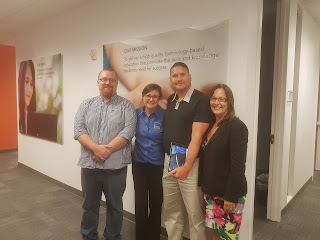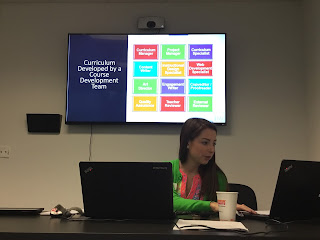Florida Virtual School
Mark & I worked with Florida Virtual School (FLVS) over 3 days of intensive PL. We gained a good overview of their operations and what it takes to produce and facilitate successful online courses.
An interesting thing to note was that FLVS use something known as Learning Tool Interoperability (LTI) to develop their own proprietary courses (using additional software) to make them Learning Mangement System (LMS) 'agnostic'. They can then provide their courses to organisations regardless of which LMS they use, whether it is Canvas, Moodle, etc, and are also future-proofing their work.
The pedagogical approach and administration at FLVS was far more structured than with any other online courses that we had seen. For example, there were weekly target quotas for student contact and 'evidence of engagement' for the teachers, that were also checked by a Lead Teacher.
 |
| Mark & Josh with FLVS staff Carrie Alexander and Crystal Howard. I really liked the glass prints and mottos. |
 |
| Josh at the FLVS front desk. |
There were prescribed amounts of interactive content built into each course, such videos, quizzes, physical manipulatives, games or puzzles.
Pre-tests and post-tests are given for every module. One form of assessment that I found interesting and authentic were called 'Discussion Based Assessments' or DBAs. The teacher would conduct a recorded interview with the student and pose questions that probe for understanding of a particular concept. The DBA would then be used as evidence of attainment of a particular standard/outcome.
The development of a course was a rigorous process, undergoing various stages of construction, contributions from various experts, scrutiny and quality assurance before publication and facilitation with actual students.
In the development of a course, there were a dozen separate professionals to oversee different aspects, from Graphic Designer, to Subject Matter Expert, to Instructional Designer, to Web Developer. On a legal side of things, courses had to comply with copyright laws and meet accessibility standards.
 |
| 12 areas of expertise in course construction. |
FLVS and their courses meet various accreditation standards through State and national bodies for quality online teaching and University admission. FLVS also regularly conducts student and parent satisfaction surveys. Another interesting thing to note (it was a very interesting place!) was that many States and districts actually require an online class to be completed to obtain a high school certificate, and some of those States and districts will choose FLVS to fulfill that requirement.
FLVS presents numerous examples, blueprints, processes, etc, that could be applied to online learning in Tasmania. We were supplied with extra resources from FLVS that provide further insight into how they operate, including trial access to course examples in Canvas.
As has been a theme of our Hardie, the teacher - the human element - is still the special sauce. The teacher and the relationship they develop with their charges and the learning that they masterfully facilitate is still the core business of teaching. There is nothing to suggest that the role of the teacher would be made redundant through technology. The technology might help to automate administrative tasks and improve various inefficiencies but does not replace the role of the teacher as learning facilitator. The technology is merely a tool that good teachers would use to achieve excellent outcomes for students.
Josh Dean




Comments
Post a Comment